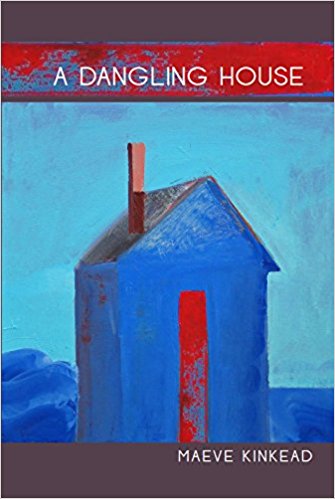Books |
Maeve Kinkead: A Dangling House
By
Published: Apr 26, 2017
Category:
Poetry
Maeve Kinkead was in my class at a small New England boarding school. If I didn’t really know her there, it was because I was awestruck and — rare for me — tongue-tied. Maeve acted. She wrote poetry. And she was beautiful in an ethereal way that suggested she was made of finer, fragile stuff.
In fact, as viewers of TV soap operas know, Maeve was no hothouse flower. She was Vanessa Chamberlain Lewis on “The Guiding Light” for more than 25 years. Here’s just the start of her story, as chronicled on a soap opera site (there’s more, and worse, and crazier in the full account):
Vanessa arrived in Springfield as a spoiled rich girl who flirted with all the married men in town. After a quick marriage, she seduced Ross Marler and then began a string of affairs. He repaid her with an affair of his own and threats of a split… She began eying her doctor, Ed Bauer, but became involved in a murderous blackmail ring that doomed her relationship with the doctor…
In 2014, half a century after we graduated from boarding school, our class convened for the first reunion I felt obligated to attend. The school has a ritual: At the alumni lunch, there are two speakers from the 50th class — one female, one male. That meant Maeve. And me. So there we were, across decades and marriages and families and careers and joys and heartbreaks, meeting for the first time. We exchanged emails, then drafts. We became friends. That friendship is oxygen for me. I won’t be objective here.
Maeve Kinkead has, finally, published a book of poems. “A Dangling House” is a thin book. Its 47 poems fill just 61 pages, and there’s plenty of white space on those pages. But they’re pure protein. [To buy the book from Amazon, click here.]
The challenge of the book for a reader is figuring out the story behind the poems. Maeve and I have seen one another regularly for three years now, and it is a measure of her discretion that I didn’t know the backstory until I read the poems and demanded an explanation. Yes, I know Archibald MacLeish’s dictum: “A poem should not mean/ But be.” Still…
There are only two facts to know. One is that Maeve was not her parents’ first daughter. She had a sister, Kathleen, who drowned when she was five years old. Maeve was born a year later — and although her parents never used that phrase, she was never unaware that she was “the replacement child.” The other fact is that, six years ago, her brother “went and shot his head/ in with the gun his family didn’t know/ he owned and left some inked scratches that read/ how much love… should have done better.”
A mediocre poet would write about loss — about unending grief. A gifted poet would do what Maeve as done: use head-splitting events to explore what is seen but not discussed, and to move ahead. Not because, as happens in bad American books and movies, she’s had “closure,” but because, like the main characters in “Moonlight” and “Manchester By the Sea,” she knows there’s no such thing. What there is: learning to live with your personal history — and, if you’re a poet, to dig deep and share what you’ve learned. To see these poems as bummers you want to avoid is a mistake. By the time you get to the epilogue, you have been reminded that courage is more powerful than tragedy, and that the price of looking hard at what has hurt you is less than the cost of evasion. If you’ve been damaged — and who hasn’t been? — you’ll get the unspoken message: These poems are what triumph looks like.
Now that you know what you’re dealing with, a poem…
Objective
Write truthful
the interior life
of the extended family,
letters marching down
creamy parchment
like a file of reticulated
ants. Slip it in a fine
envelope and affix
colorful and antiquated
stamps prised from
sleeves of the collection
forgotten in the closet,
walk 4 miles to the landmark
Post Office and bury
it in the garbage can
out front. Away, away.
And the epilogue…
Fire Island
On the shingle they stood, a small sad band,
gazing at what they’d keep if they could.
Yellow broom grew on smooth hills of sand
when they came to shutter their house for good.
“What they’d keep if they could” — “if”…but they can’t, can they?
And then the last phrase, “for good.” Meaning “forever.” And then the other meaning, the positive one.
As a late-life debut? Exceptional. For the reader? Enriching in the extreme.


